The Government's Action Program on Breakthrough Development of Education and Training (GD-DT) clearly states that in 2025, the Ministry of Education and Training must develop a Project "Making English the Second Language in Schools for the 2025-2035 Period, with a Vision to 2045" (hereinafter referred to as the English Project).
22,000 more teachers needed
Making English the second language in schools is not only an inevitable trend, but also a strategic task of the Vietnamese education sector.
The Ministry of Education and Training said it is actively developing a draft national English project with the general goal of English being widely and regularly used in communication, study, research and work; at the same time, enhancing the competitiveness of human resources in the new era.
According to Mr. Thai Van Tai, Director of the General Education Department, Ministry of Education and Training, the project aims to have English widely used in all 50,000 schools with about 30 million students and 1 million teachers and lecturers by 2045. The implementation roadmap is divided into 3 phases: 5 years (2025-2030), 10 years (2030-2040) and 5 years (2040-2045). Key tasks and solutions include raising social awareness; perfecting institutions; developing the teaching staff; building programs and learning materials; innovating exams, tests and assessments; applying technology and artificial intelligence...
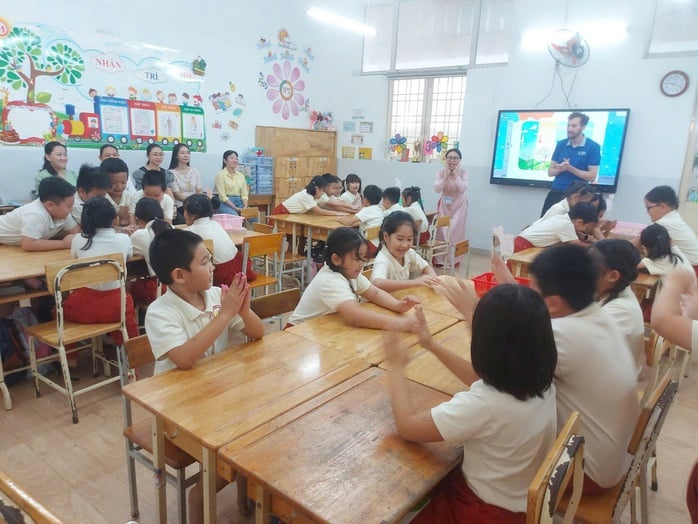
Many schools in Ho Chi Minh City have English classes with foreigners to improve students' communication skills. Photo: PHUONG QUYNH
The project is expected to be implemented throughout the entire education system, so it is necessary to add about 12,000 preschool English teachers, nearly 10,000 primary school teachers, and at the same time train at least 200,000 teachers capable of teaching in English by 2030.
Mr. Thai Van Tai said that the resources for implementation include the state budget and the participation and contributions of businesses, organizations and individuals. The representative of the Ministry of Education and Training affirmed that the success of the project requires social consensus and persistent implementation over 20 years, in order to contribute to improving national competitiveness and deep international integration.
Deputy Minister of Education and Training Pham Ngoc Thuong said that the implementation roadmap until 2045 needs to be implemented flexibly, with localities with favorable conditions being able to take the lead and play a leading role, and disadvantaged areas will follow suit. Making English the second language must be linked to the breakthrough viewpoint in the spirit of Resolution 71-NQ/TW of the Politburo , which is a breakthrough in thinking, awareness, institutions and resources.
Regarding resources, Mr. Pham Ngoc Thuong said that the state plays a leading role, using public investment as a driving force, and at the same time encourages social mobilization, but cannot rely solely on socialization. The Deputy Minister of Education and Training also noted the division of universalization levels appropriate to each region, starting from familiarization at preschool level, moving towards wider universalization in primary school and the following levels.
Goals and roadmap for each region
Ms. Tran Thi Huyen, Acting Director of the Department of Education and Training of Can Tho City, expressed concerns about the capacity of teachers and infrastructure conditions when implementing the project. With the reality that a large number of students are children of ethnic minorities, many of whom are not yet proficient in Vietnamese, there needs to be a suitable roadmap for each locality to ensure synchronous and effective implementation. Sharing this view, Mr. Lam The Hung, Deputy Director of the Department of Education and Training of Tuyen Quang province, commented that implementing the project in localities with many ethnic minorities is a heavy task. Despite focused investment in resources, teaching Vietnamese before entering grade 1 for ethnic minority children has not yet achieved the desired results, students can understand but their ability to express is limited. In that context, implementing English as a second language is even more difficult. Therefore, there needs to be goals, roadmaps and required results suitable to the conditions of each region.
Professor Nguyen Quy Thanh, Principal of the University of Education - Vietnam National University, Hanoi, believes that training English as a second language must be associated with training thinking, the ability to receive and reflect on culture, and at the same time combine with rational thinking to create real change. The period of 4-7 years old is the "golden period" for learning languages, but if children learn English too early, it can affect their ability to master their mother tongue and receive Vietnamese culture.
Professor Huynh Van Son, Principal of Ho Chi Minh City University of Education, emphasized that when implementing the project, it is necessary to adhere to the principle of divergence, avoid spreading out and have a specific direction. Regarding preschool level, Professor Huynh Van Son said that implementing it on a national scale is feasible, but it is necessary to consider the mandatory level, and at the same time, it is necessary to anticipate the negative impacts related to culture and mother tongue language. Regarding training and fostering, it is necessary to re-survey the force of foreign language teachers; in current conditions, human resources and technology can completely meet the requirements if organized and exploited properly.
Regarding the teacher perspective of the project, the principal of Hanoi National University of Education, Nguyen Duc Son, said that in recent years, Hanoi National University of Education has organized pedagogical internships for students at international or bilingual schools, organized specialized English clubs, seminars and thematic discussions with the participation of international lecturers. At the same time, piloting sending students to study some equivalent courses abroad in the form of exchange. Each year, the admission is improved in terms of input and tightened in terms of output. "Training and improving the qualifications of the teaching staff is a prerequisite for implementing the project," Mr. Son stated.
Need the most feasible solution
Speaking with the Lao Dong Newspaper, Ms. Bui Thi An, a delegate of the 13th National Assembly, also emphasized that making English the second language in schools is very necessary, but it must be a very long process.
"This is a difficult task. The Ministry of Education and Training must come up with the most feasible solutions and answer the question of how to organize the implementation, especially regarding the issue of teachers. If English is to become the second language in schools, there must be enough English teachers in terms of quantity and quality. The Ministry of Education and Training needs to come up with a project to train English teachers for all levels," Ms. An emphasized.
Two key factors
Regarding the project's eight major solutions, Deputy Minister Pham Ngoc Thuong particularly emphasized two key factors: institutions and teacher training. Innovation in teacher training programs and appropriate remuneration policies, especially for teachers who both teach English and use English to teach science subjects, are urgent requirements. The Deputy Minister of Education and Training also emphasized the role of applying technology and artificial intelligence in foreign language teaching and learning; launching an emulation movement to learn English; learning and replicating successful models in localities and educational institutions.
Source: https://nld.com.vn/kien-tri-20-nam-de-tieng-anh-thanh-ngon-ngu-thu-2-196250923211842414.htm


![[Photo] Discover unique experiences at the first World Cultural Festival](https://vphoto.vietnam.vn/thumb/1200x675/vietnam/resource/IMAGE/2025/10/11/1760198064937_le-hoi-van-hoa-4199-3623-jpg.webp)
![[Photo] Opening of the World Cultural Festival in Hanoi](https://vphoto.vietnam.vn/thumb/1200x675/vietnam/resource/IMAGE/2025/10/10/1760113426728_ndo_br_lehoi-khaimac-jpg.webp)
![[Photo] General Secretary attends the parade to celebrate the 80th anniversary of the founding of the Korean Workers' Party](https://vphoto.vietnam.vn/thumb/1200x675/vietnam/resource/IMAGE/2025/10/11/1760150039564_vna-potal-tong-bi-thu-du-le-duyet-binh-ky-niem-80-nam-thanh-lap-dang-lao-dong-trieu-tien-8331994-jpg.webp)






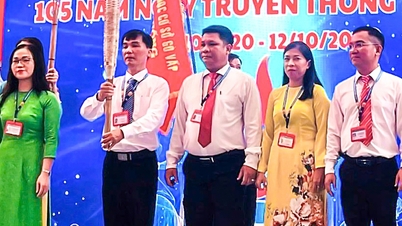













![[Photo] Ho Chi Minh City is brilliant with flags and flowers on the eve of the 1st Party Congress, term 2025-2030](https://vphoto.vietnam.vn/thumb/1200x675/vietnam/resource/IMAGE/2025/10/10/1760102923219_ndo_br_thiet-ke-chua-co-ten-43-png.webp)





































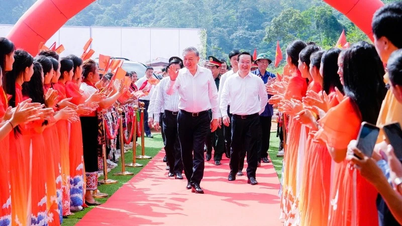





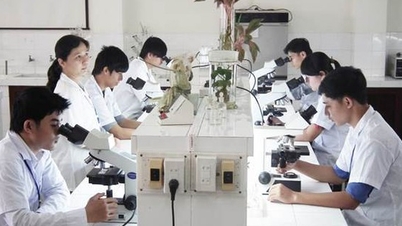


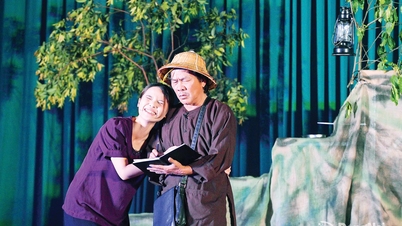






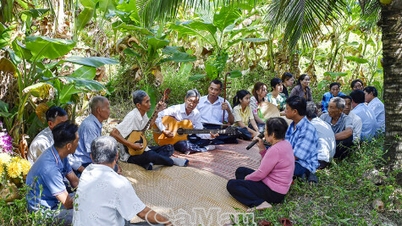
















Comment (0)